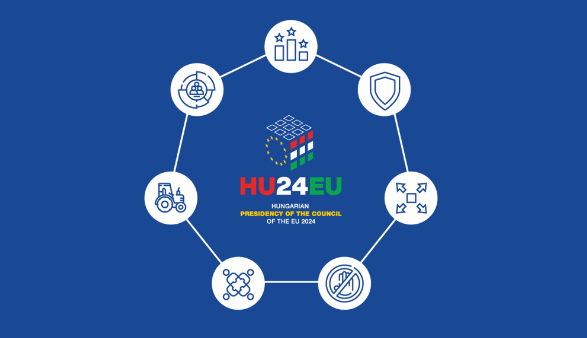19 June 2024

On the 1st of July, 2024, Hungary will begin its six-month rotating presidency of the Council of the European Union until December 2024. The main priorities outlined in the programme are the following:
- Enhancing European Competitiveness
Hungary aims to tackle economic challenges by boosting productivity and competitiveness across the EU. The adoption of a New European Competitiveness Deal is a key priority of the Hungarian presidency to revitalise economic growth through an open economy and international economic cooperation, technology-neutral industrial strategy, support for small and medium-sized enterprises, and the promotion of green and digital transitions.
- Strengthening European Defence
In light of ongoing global conflicts, Hungary will emphasise enhancing the EU's defence capabilities. This includes strengthening the European Defence Technological and Industrial Base and improving defence procurement cooperation among Member States. The presidency will also focus on implementing the Strategic Compass to reinforce the EU's security and crisis management capacities.
- Merit-Based Enlargement Policy
Hungary will advocate for a balanced and credible EU enlargement policy, with a particular focus on the Western Balkans. Recognising the geopolitical and economic benefits of integrating this region, Hungary plans to host consultations and summits to pursue this goal.
- Addressing Illegal Migration
The Hungarian presidency will prioritise tackling illegal migration by enhancing cooperation with neighbouring countries and key transit states. Efforts will include curbing human smuggling, improving asylum rules, and ensuring robust external border protection, with an emphasis on effective return policies and innovative solutions.
- Shaping Future Cohesion Policy
To promote harmonious development and reduce regional disparities, Hungary will initiate strategic debates on the future of the EU's cohesion policy. This policy, crucial for achieving economic, social, and territorial cohesion, will be examined for its role in enhancing competitiveness and addressing demographic challenges.
- A Farmer-Centred EU Agricultural Policy
Recognising the challenges faced by European farmers, Hungary will push for an EU agricultural policy that ensures food security and supports sustainable practices. The presidency will guide discussions on post-2027 agricultural rules, aiming to balance the goals of the European Green Deal with the needs of farmers.
- Addressing Demographic Challenges
Hungary will address the demographic issues of an aging population, labour shortages, and rural depopulation. Highlighting the EU Commission’s demographic toolbox, Hungary aims to bring attention to these challenges and propose solutions that enhance the EU’s competitiveness and sustainability.
Moreover, in its detailed programme, the Hungarian Presidency outlined the actions it intends to take on specific topics:
Concerning the Customs Union Code, the goals of the revision are the following: to introduce several simplifications facilitating customs procedures; to set up a common EU customs data hub; and to create a new EU customs authority that would help Member States focus their inspection capacities on the most important areas. The Hungarian presidency priority is to continue this substantive debate to ensure that the emerging customs union is future-proof and capable of addressing the challenges of the coming decades more quickly and efficiently.
Hungary is committed to enhancing ties between the EU and Asia, particularly with the Indo-Pacific region. This includes intensifying trade, investment, and connectivity, with a pragmatic and balanced approach toward China and India. The presidency will also focus on implementing the Economic Security Package and strengthening cooperation with the European Commission on investment protection policies. The Hungarian presidency supports the assessment of potential agreements with Asian partners.
The Hungarian presidency will discuss and negotiate the elements of the Greening Freight Transport package. These are meant to help improve rail infrastructure management (Railway Infrastructure Capacity Regulation), provide better information on greenhouse gas emissions from freight transport (CountEU Emission Regulation) and support the shift from road freight to lower emission modes (Combined Transport Directive). The negotiation of the revised Directive on harmonised river information services (RIS) for inland waterways in the Community will help increase the efficiency of transport flows by improving traffic and transport management in inland waterway transport.
The Hungarian Presidency will also focus on the fight against drug trafficking, promoting the implementation of the EU Drugs Strategy and Action Plan and the EU Roadmap for combating drug trafficking and organised crime.













